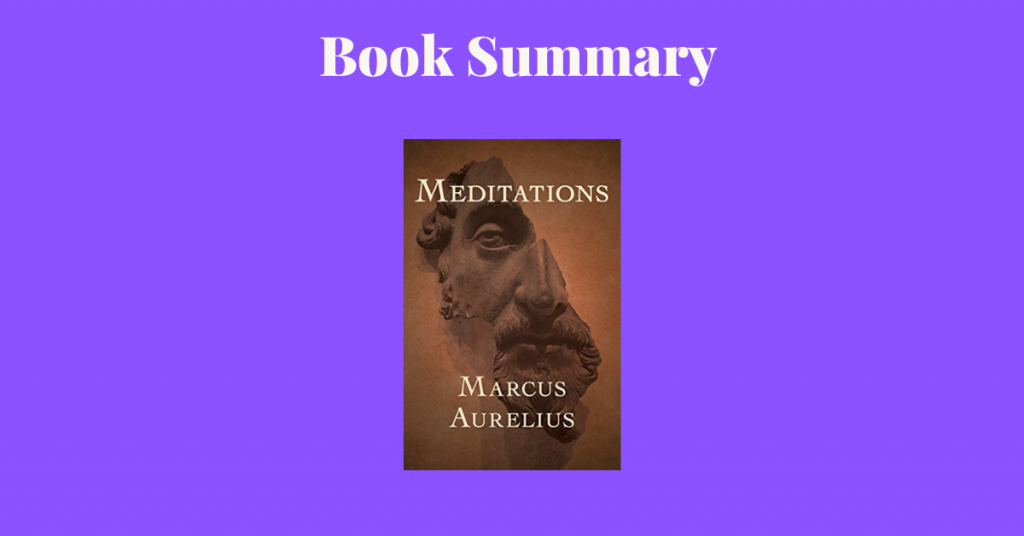Meditations are written by Marcus Aurelius, a Roman Emperor who ruled from 161-180. He was the last from The Good Emperors (Nerva, Trajan, Hadrian, Antonius Pius) and Meditations serve as personal writings on his ideology, Stoicism, ruling, and dealing with people.
Book Title: Meditations
Author: Marcus Aurelius
Date of Reading: March, 2018
Rating: 9/10
What Is Being Said In Detail:
There are multiple versions/translations of Marcus Aurelius’ Meditations. I followed Ryan Holiday‘s advice and read the one by Gregory Hays. Meditations are structured in 12 short chapters. Each chapter gives various pieces of advice and were written at different times over the emperor’s rule. The chapters are written in a form of quotes, some only one sentence short, while others can span over a paragraph.
We only have the name of the first three chapters:
- Debts and lessons
- On the River Gran, Among the Quadi
- In Carnuntum
The remaining chapters are titled Chapters 4-12.
Chapter 4 talks about finding solitude in our own minds.
Chapter 5 tells us to wake up every morning and do good out there (consistency of goodness).
Chapter 6 tells us of the perils of revenge and urges us not to use it.
Chapter 7 advocates for patience and tolerance.
Chapter 8 explains that we always need to be in touch with our humanity.
Chapters 9, 10, and 11 talk about living moderately, sincerely, and modestly.
Chapter 12 is about human interactions and the question of why we love ourselves the most, but value the opinion of others more than ours.
Meditations have some really great messages such as:
- The evil other people do only harms you if you do evil in response
- Fame and desire aren’t worth chasing after
- Life is too short to complain
- The only problems we have in our lives is those that we create in our heads
Most Important Keywords, Sentences, Quotes:
Introduction – Gregory Hays
“States will never be happy until rulers become philosophers or philosophers become rulers. —PLATO, The Republic”
“In 137, however, Ceionius died unexpectedly, and Hadrian was forced to cast about for a new successor. His choice fell on the childless senator Antoninus, whom he selected with the proviso that Antoninus should in turn adopt Marcus (his nephew by marriage) along with Ceionius’s son Lucius Verus, then aged seven. Marcus took on the family name of his adopted father, becoming Marcus Aurelius Antoninus.”
“Marcus died at age fifty-eight, the first emperor to pass on the throne to his son since Vespasian a century before.”
“Stoic school. The movement takes its name from the stoa (“porch” or “portico”) in downtown Athens where its founder, Zeno (332/3- 262 B.C.), taught and lectured.”
“In the same way, humans are responsible for their choices and actions, even though these have been anticipated by the logos and form part of its plan. Even actions which appear to be—and indeed are—immoral or unjust advance the overall design, which taken as a whole is harmonious and good. They, too, are governed by the logos.”
“Stoicism has even been described, not altogether unfairly, as the real religion of upper-class Romans.”
“In the process it became a rather different version of the philosophy from that taught by Zeno and Chrysippus.”
“Roman Stoicism, by contrast, was a practical discipline—not an abstract system of thought, but an attitude to life.”
“Indeed, the application of the adjective “stoic” to a person who shows strength and courage in misfortune probably owes more to the aristocratic Roman value system than it does to Greek philosophers.”
“The questions that the Meditations tries to answer are primarily metaphysical and ethical ones: Why are we here? How should we live our lives? How can we ensure that we do what is right? How can we protect ourselves against the stresses and pressures of daily life? How should we deal with pain and misfortune? How can we live with the knowledge that someday we will no longer exist?”
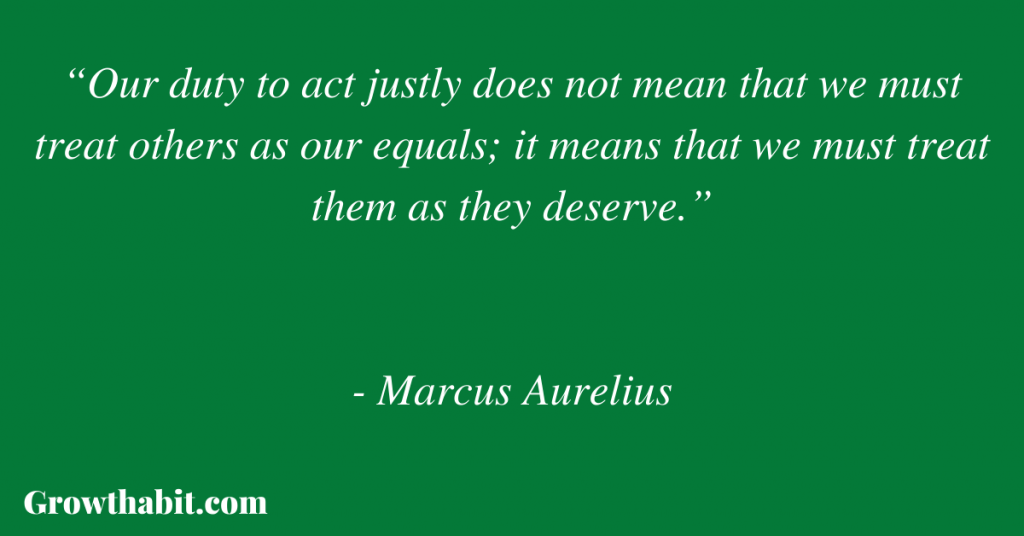
“Chief among these are inappropriate value judgments: the designation as “good” or “evil” of things that in fact are neither good nor evil.”
“It is, in other words, not objects and events but the interpretations we place on them that are the problem.”
“Our duty to act justly does not mean that we must treat others as our equals; it means that we must treat them as they deserve.”
“The latter governs our approach to the things in our control, those that we do; the discipline of will governs our attitude to things that are not within our control, those that we have done to us (by others or by nature).”
“By contrast, things outside our control have no ability to harm us. Acts of wrongdoing by a human agent (torture, theft,or other crimes) harm the agent, not the victim.”
“This, of course, we must not do. Instead we must see things for what they are (here the discipline of perception is relevant) and accept them, by exercising the discipline of will, or what Epictetus calls (in a phrase quoted by Marcus) “the art of acquiescence.”
“One example is the so-called Socratic paradox, the claim that no one does wrong willingly, and that if men were able to recognize what is right, they would inevitably do it. “They are like this,” Marcus says of other people, “because they can’t tell good from evil” (2.1), and he repeats this assertion elsewhere.”
“The best revenge is not to be like that. (6.6) Straight, not straightened. (7.12) The fencer’s weapon is picked up and put down again. The boxer’s is part of him. (12.9)”
“important Roman value—and the Epicurean equation of the good with pleasure was bound to raise eyebrows among conservative Romans. “Eat, drink and be merry” was popularly supposed to be the Epicureans’ motto, though Epicurus himself had been quite explicit in identifying pleasure with intellectual contemplation rather than the vulgar enjoyment of food and sex.”
“predominance of the imperative in the text; its purpose is not to describe or reflect (let alone to “meditate”), but to urge, direct, and exhort.”
“A persistent motif is the need to restrain anger and irritation with other people, to put up with their incompetence or malice, to show them the errors of their ways.”
“The fall of Constantinople to the Turks in 1453 led to an exodus of scholars, bringing with them the Greek texts that inspired the Italian Renaissance.”
“It is not outside, but within, and when all is lost, it stands fast.””
“The works of the two most important Stoics, Zeno and Chrysippus, are largely lost;”
Book 1 – DEBTS AND LESSONS
“To read attentively—not to be satisfied with “just getting the gist of it.” And not to fall for every smooth talker.”
“to display expertise without pretension.”
“Not to be constantly telling people (or writing them) that I’m too busy, unless I really am. Similarly, not to be always ducking my responsibilities to the people around me because of “pressing business.”
“Indifference to superficial honors.”
“His dogged determination to treat people as they deserved.”
“And that I never lost control of myself with any of them, although I had it in me to do that, and I might have, easily.”
Book 2 – ON THE RIVER GRAN, AMONG THE QUADI
“When you wake up in the morning, tell yourself: The people Ideal with today will be meddling, ungrateful, arrogant, dishonest, jealous, and surly. They are like this because they can’t tell good from evil.”
“Discard your thirst for books, so that you won’t die in bitterness, but in cheerfulness and truth, grateful to the gods from the bottom of your heart.”
“Do external things distract you? Then make time for yourself to learn something worthwhile; stop letting yourself be pulled in all directions. But make sure you guard against the other kind of confusion. People who labor all their lives but have no purpose to direct every thought and impulse toward are wasting their time—even when hard at work.”
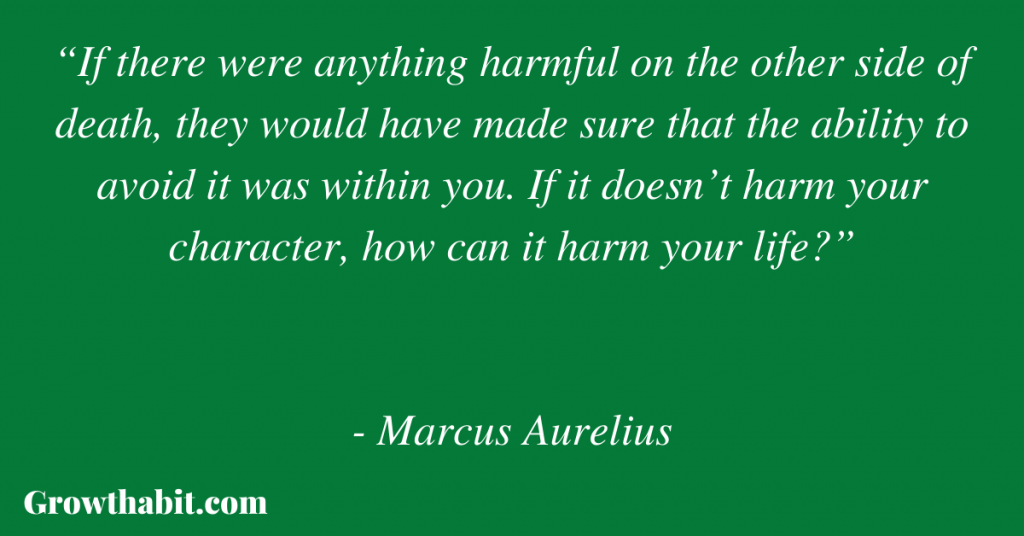
“If there were anything harmful on the other side of death, they would have made sure that the ability to avoid it was within you. If it doesn’t harm your character, how can it harm your life?”
“Then what can guide us? Only philosophy.”
“Which means making sure that the power within stays safe and free from assault, superior to pleasure and pain, doing nothing randomly or dishonestly and with imposture, not dependent on anyone else’s doing something or not doing it.”
Book 3 – IN CARNUNTUM
“Don’t waste the rest of your time here worrying about other people—unless it affects the common good.”
“Never under compulsion, out of selfishness, without forethought, with misgivings. Don’t gussy up your thoughts. No surplus words or unnecessary actions.”
“Anything at all: the applause of the crowd, high office, wealth, or self indulgence. All of them might seem to be compatible with it—for a while. But suddenly they control us and sweep us away.”
“Never regard something as doing you good if it makes you betray a trust, or lose your sense of shame, or makes you show hatred, suspicion, ill will, or hypocrisy, or a desire for things best done behind closed doors.”
“Nothing earthly succeeds by ignoring heaven, nothing heavenly by ignoring the earth.”
Book 4
“People try to get away from it all—to the country, to the beach, to the mountains. You always wish that you could too. Which is idiotic: you can get away from it anytime you like. By going within. Nowhere you can go is more peaceful—more free of interruptions—than your own soul.”
”The world is nothing but change. Our life is only perception.”
“Choose not to be harmed—and you won’t feel harmed. Don’t feel harmed—and you haven’t been.”
“It can ruin your life only if it ruins your character. Otherwise it cannot harm you—inside or out.”
“The tranquillity that comes when you stop caring what they say. Or think, or do. Only what you do.”
”If you seek tranquillity, do less.” Or (more accurately) do what’s essential—what the logos of a social being requires, and in the requisite way.”
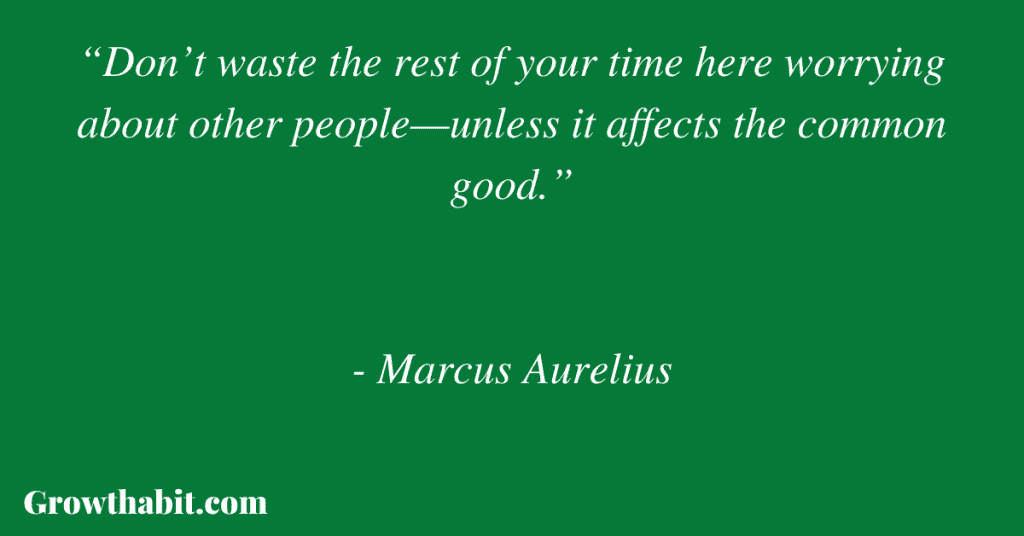
“Ask yourself at every moment, “Is this necessary?”
“Only this: proper understanding; unselfish action; truthful speech. A resolve to accept whatever happens as necessary and familiar, flowing like water from that same source and spring.”
“It’s unfortunate that this has happened. No. It’s fortunate that this has happened and I’ve remained unharmed by it—not shattered by the present or frightened of the future. It could have happened to anyone. But not everyone could have remained unharmed by it.”
“Does what’s happened keep you from acting with justice, generosity, self-control, sanity, prudence, honesty, humility, straightforwardness, and all the other qualities that allow a person’s nature to fulfill itself?”
Book 5
“But it’s nicer here. . . . So you were born to feel “nice”?”
“Some people, when they do someone a favor, are always looking for a chance to call it in. And some aren’t, but they’re still aware of it—still regard it as a debt. But others don’t even do that.”
“They don’t make a fuss about it. They just go on to something else, as the vine looks forward to bearing fruit again in season. We should be like that. Acting almost unconsciously.”
“The impediment to action advances action. What stands in the way becomes the way.”
“I was once a fortunate man but at some point fortune abandoned me. But true good fortune is what you make for yourself. Good fortune: good character, good intentions, and good actions.”
Book 6
“Not to assume it’s impossible because you find it hard. But to recognize that if it’s humanly possible, you can do it too.”
“You take things you don’t control and define them as “good” or “bad.” And so of course when the “bad” things happen, or the “good” ones don’t, you blame the gods and feel hatred for the people responsible—or those you decide to make responsible.”
“If we limited “good” and “bad” to our own actions, we’d have no call to challenge God, or to treat other people as enemies.”
“Ambition means tying your well-being to what other people say or do. Self-indulgence means tying it to the things that happen to you. Sanity means tying it to your own actions.”
Book 7
“Look at the past—empire succeeding empire—and from that, extrapolate the future: the same thing. No escape from the rhythm of events. Which is why observing life for forty years is as good as a thousand. Would you really see anything new?”
“Look at who they really are, the people whose approval you long for, and what their minds are really like. Then you won’t blame the ones who make mistakes they can’t help, and you won’t feel a need for their approval. You will have seen the sources of both—their judgments and their actions.”
“Take care that you don’t treat inhumanity as it treats human beings.”
“It’s quite possible to be a good man without anyone realizing it. Remember that.”
“you don’t need much to live happily. And just because you’ve abandoned your hopes of becoming a great thinker or scientist, don’t give up on attaining freedom, achieving humility, serving others, obeying God.”
Book 8
“Then where is it to be found? In doing what human nature requires. How? Through first principles. Which should govern your intentions and your actions. What principles? Those to do with good and evil.”
“Alexander and Caesar and Pompey. Compared with Diogenes, Heraclitus, Socrates? The philosophers knew the what, the why, the how. Their minds were their own. The others? Nothing but anxiety and enslavement.”
“Then do it, without hesitation, and speak the truth as you see it. But with kindness. With humility. Without hypocrisy”
“Blame no one. Set people straight, if you can. If not, just repair the damage. And suppose you can’t do that either. Then where does blaming people get you? No pointless actions.”
“This is what you deserve. You could be good today. But instead you choose tomorrow.”
“Three relationships:
i. with the body you inhabit; ii. with the divine, the cause of everything in all things; iii. with the people around you.”
“You have to assemble your life yourself—action by action. And be satisfied if each one achieves its goal, as far as it can. No one can keep that from happening. —But there are external obstacles. . . . Not to behaving with justice, self-control, and good sense. —Well, but perhaps to some more concrete action. But if you accept the obstacle and work with what you’re given, an alternative will present itself —another piece of what you’re trying to assemble. Action by action.”
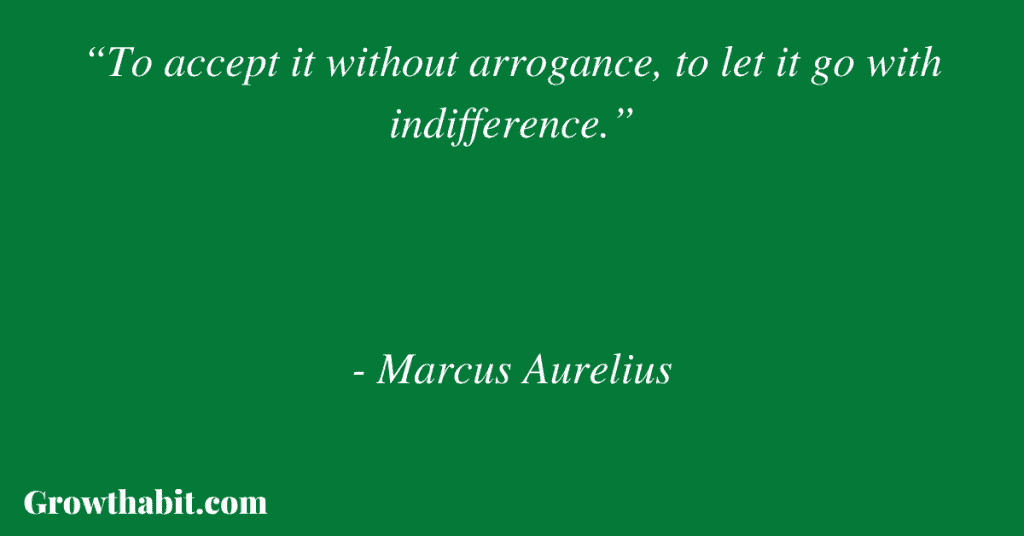
“To accept it without arrogance, to let it go with indifference.”
“Don’t let your imagination be crushed by life as a whole. Don’t try to picture everything bad that could possibly happen. Stick with the situation at hand, and ask, “Why is this so unbearable? Why can’t I endure it?” You’ll be embarrassed to answer.”
”To the best of my judgment, when I look at the human character I see no virtue placed there to counter justice. But I see one to counter pleasure: self-control.”
“Stop perceiving the pain you imagine and you’ll remain completely unaffected. —”You?” Your logos. —But I’m not just logos. Fine. Just don’t let the logos be injured. If anything else is, let it decide that for itself.”
“What humans experience is part of human experience. The experience of the ox is part of the experience of oxen, as the vine’s is of the vine, and the stone’s what is proper to stones. Nothing that can happen is unusual or unnatural, and there’s no sense in complaining. Nature does not make us endure the unendurable.”
“The mind without passions is a fortress. No place is more secure. Once we take refuge there we are safe forever. Not to see this is ignorance. To see it and not seek safety means misery.”
“What doesn’t transmit light creates its own darkness.”
Book 9
“And you can also commit injustice by doing nothing.”
“Objective judgment, now, at this very moment. Unselfish action, now, at this very moment. Willing acceptance—now, at this very moment—of all external events. That’s all you need.”
“Today I escaped from anxiety. Or no, I discarded it, because it was within me, in my own perceptions—not outside.”
“A rock thrown in the air. It loses nothing by coming down, gained nothing by going up.”
“Enter their minds, and you’ll find the judges you’re so afraid of—and how judiciously they judge themselves.”
“When you face someone’s insults, hatred, whatever . . . look at his soul. Get inside him. Look at what sort of person he is. You’ll find you don’t need to strain to impress him.”
“And don’t go expecting Plato’s Republic; be satisfied with even the smallest progress, and treat the outcome of it all as unimportant.”
“How many people don’t even know your name. How many will soon have forgotten it. How many offer you praise now—and tomorrow, perhaps, contempt. That to be remembered is worthless. Like fame. Like everything.”
“You can discard most of the junk that clutters your mind—things that exist only there—and clear out space for yourself:”
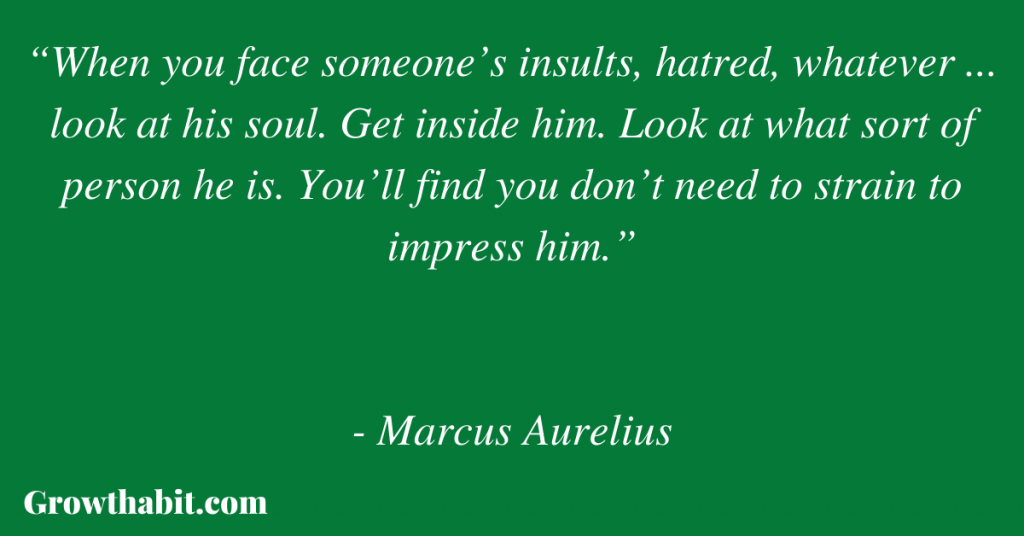
“Either the gods have power or they don’t. If they don’t, why pray? If they do, then why not pray for something else instead of for things to happen or not to happen? Pray not to feel fear. Or desire, or grief. If the gods can do anything, they can surely do that for us.”
“Then isn’t it better to do what’s up to you—like a free man—than to be passively controlled by what isn’t, like a slave or beggar?”
“Start praying like this and you’ll see. Not “some way to sleep with her”—but a way to stop wanting to. Not “some way to get rid of him”—but a way to stop trying. Not “some way to save my child”—but a way to lose your fear. Redirect your prayers like that, and watch what happens.”
Book 10
“Everything that happens is either endurable or not. If it’s endurable, then endure it. Stop complaining. If it’s unendurable . . . then stop complaining. Your destruction will mean its end as well. Just remember: you can endure anything your mind can make endurable, by treating it as in your interest to do so. In your interest, or in your nature.”
“If they’ve made a mistake, correct them gently and show them where they went wrong. If you can’t do that, then the blame lies with you. Or no one.”
“Keep in mind that “sanity” means understanding things—each individual thing—for what they are. And not losing the thread.”
“So too a healthy mind should be prepared for anything. The one that keeps saying, “Are my children all right?” or “Everyone must approve of me” is like eyes that can only stand pale colors, or teeth that can handle only mush.”
“It doesn’t matter how good a life you’ve led. There’ll still be people standing around the bed who will welcome the sad event.”
“Learn to ask of all actions, “Why are they doing that?” Starting with your own.”
Book 11
“Someone despises me. That’s their problem. Mine: not to do or say anything despicable. Someone hates me. Their problem.”
“When you start to lose your temper, remember: There’s nothing manly about rage.”
“That to expect bad people not to injure others is crazy. It’s to ask the impossible. And to let them behave like that to other people but expect them to exempt you is arrogant—the act of a tyrant.”
“Socrates used to call popular beliefs “the monsters under the bed”—only useful for frightening children with.”
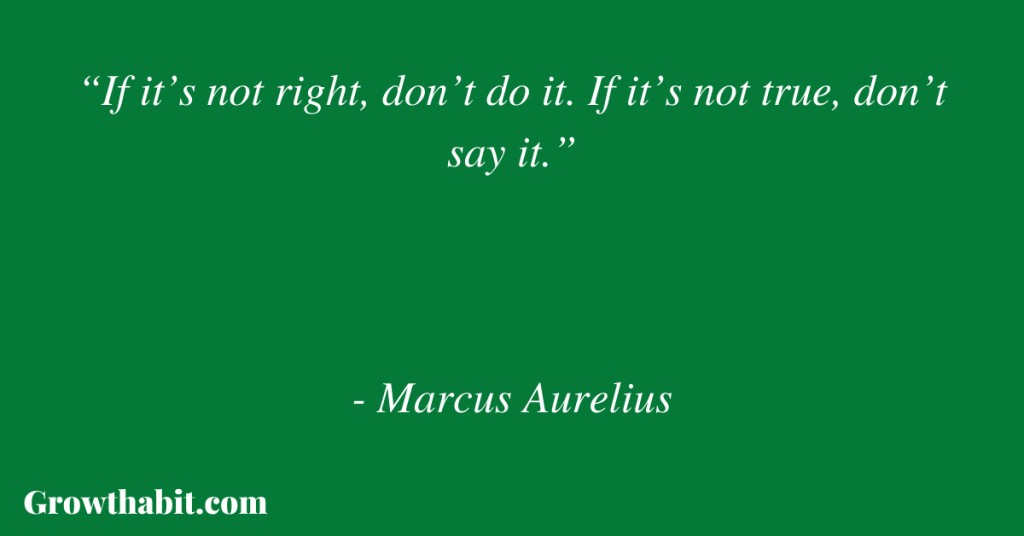
“At festivals the Spartans put their guests’ seats in the shade, but sat themselves down anywhere.”
“Grapes. Unripe . . . ripened . . . then raisins. Constant transitions. Not the “not” but the “not yet.”
“Socrates: What do you want, rational minds or irrational ones? —Rational ones. Healthy or sick? —Healthy. Then work to obtain them. —We already have. Then why all this squabbling?”
Book 12
“It never ceases to amaze me: we all love ourselves more than other people, but care more about their opinion than our own.”
“The student as boxer, not fencer. The fencer’s weapon is picked up and put down again. The boxer’s is part of him. All he has to do is clench his fist.”
“To see things as they are. Substance, cause and purpose.”
“that to expect a bad person not to harm others is like expecting fig trees not to secrete juice, babies not to cry, horses not to neigh—the inevitable not to happen.”
“If it’s not right, don’t do it. If it’s not true, don’t say it.”
“At all times, look at the thing itself—the thing behind the appearance—and unpack it by analysis: • cause • substance • purpose • and the length of time it exists.”
“That whatever happens has always happened, and always will, and is happening at this very moment, everywhere. Just like this. What links one human being to all humans: not blood, or birth, but mind.”
Book Review (Personal Opinion):
Meditations by Marcus Aurelius is a phenomenal book filled with so much wisdom and life lessons. It’s so interesting to see that the problems people faced 2,000 years ago are still the same problems that we face today. This is a book to come back to multiple times over different periods of life.
Rating: 9/10
This Book Is For (Recommend):
- A young professional looking to build his life’s philosophy
- A millennial who needs to see that some of their problems existed even 2,000 years ago
- Anyone working in the corporate world who wants to learn how to conduct themselves with poise and humility
If You Want To Learn More
Here’s a short video on the daily habits of Marcus Aurelius:
Daily Stoic
How I’ve Implemented The Ideas From The Book
Oh wow, there are so many things I learned from this book and that I practice even to this day. When I started getting some local traction with my other website, I had to remember that fame will come and go and that I shouldn’t chase it. I had to learn how to build my inner citadel and strengthen my character because that’s the only thing I carry with me.
One Small Actionable Step You Can Do
There’s a really great quote in the book that says: “The student as boxer, not fencer. The fencer’s weapon is picked up and put down again. The boxer’s is part of him. All he has to do is clench his fist.” So start practicing a skill that you can take with you wherever you go.

